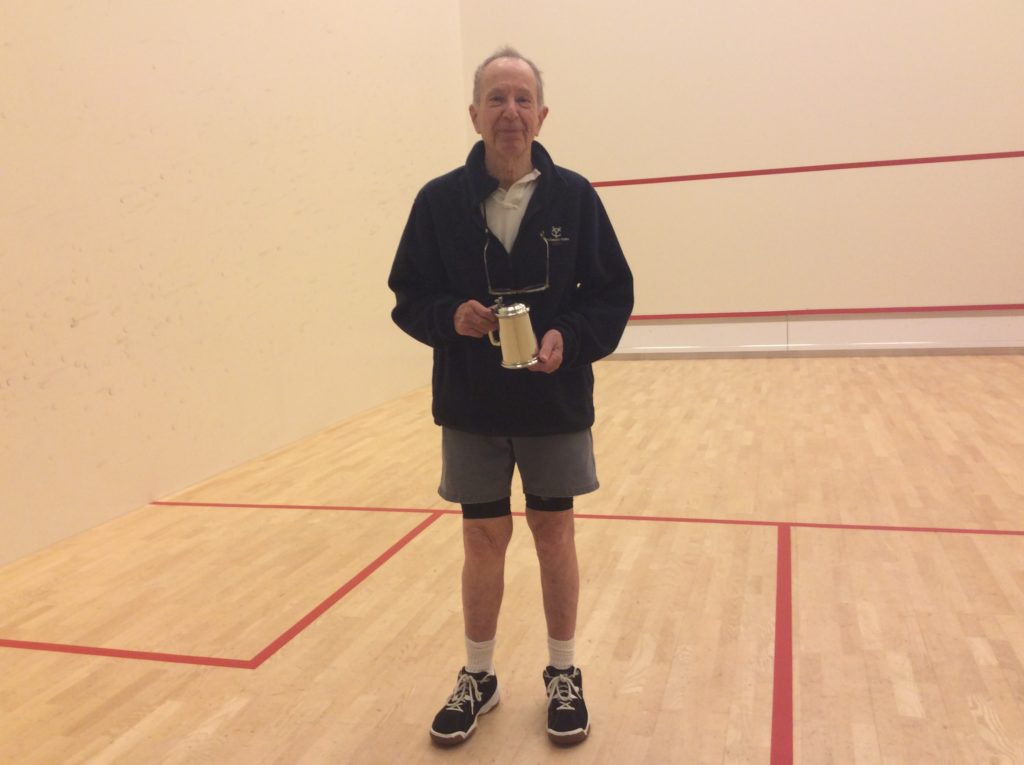
By Noel Rubinton
Last October, as he approached his ninetieth birthday, Phil Leis knew exactly where he wanted to be that milestone day—on the squash court.
Leis got in touch with one of his regular partners at PVD Squash in Providence, Stefano Crema, and arranged to play. Only when they got to the court did Leis let on that It was his birthday. “I was so happy,” said Crema, “and when I asked what the number was, he told me it was ninety. Crazy. I only have love and admiration for Phil. What a wonderful human being and amazing squash player. The ‘young’ man is unstoppable.”
After some drills and games, Crema gave Leis a present: two lessons with Arthur Gaskin, the club’s director. “I guess Stephano is telling me I need lessons,” Leis deadpanned.
Leis’ nearly sixty years with squash didn’t start until he was in his thirties. He had come to Providence to teach anthropology at Brown from Iowa State, where he played handball.. A new colleague at Brown played tennis, so Leis played tennis. Then the colleague, a member of the University Club of Providence, said, “Let’s try to play squash.”
Leis had never heard of squash. He had been involved in athletics since high school, including football—“All 150 pounds of me, I was a fullback.” He liked squash right away and progressed: “I guess I took to squash much faster than tennis because the tennis players kept observing that I was using squash strokes.” He never took a squash lesson, improving through practice and keenly watching opponents and other players. He was inspired to develop his high lob serve after watching an older, expert player. “Squash is very physical, but you have to think,” Leis said.
While teaching full-time at Brown for fifty years, many as chair of the anthropology department, Leis’ squash life was full of friendly games, league matches and tournaments within Rhode Island. Around when he retired, at age eighty, squash became even more central. Leis decided to travel for tournaments. “It was just healthy competition. I liked the competition.”
By now, Leis has won eight Rhode Island championships, six championships at his University Club, five championships in the Maugus Masters in Massachusetts, and the 2013 Eastern States Squash Tournament at the Yale Club of New York. In 2012 and 2013 he reached a pinnacle, winning the 80+ division at the National Singles. His house has a closet full of trophies.
“Phil and I have played many matches over the years, always close, always friendly, always fun,” said Edward Burlingame, a long-time competitor of Leis’ who is eighty-seven years old and himself a three-time 80+ national champion, “He is a fine competitor, armed with a devilish straight drop hit with disguise from the back of the court. I hope our matches will continue, though I am not looking forward to the next time I have to cover those drops of his. I am looking forward to the World Masters in Poland next summer and hope Phil will be there too.”
Yet Leis’ successful squash run in his eighties wasn’t so simple physically. He has had a wide range of injuries, including a knee and a hip that had to be replaced, a bout of tennis elbow was so painful that he couldn’t shake hands or play with his right hand—“for a year, I played squash with my left hand”—and a slip on an icy driveway that fractured his right elbow.
Many people would have stopped playing after these physical setbacks and looked back on a good, long squash career. But Leis has never thought of quitting. “Psychologically, I like to win, but more than that, I like to be physically active,” he said. “Walking and riding bikes and running—whatever those machines are, they are too boring. For me, I get up for a squash game, in the same way I did for a lecture. When I get injured, I always think about trying to play squash again.”
One of Leis’ trademarks has been his willingness to get on the court with players of all different ages, levels, and backgrounds. Fifteen years ago, when Leis was seventy-five and Marshall Votta was twenty-seven, the two played. Votta was relatively new to the game and the experience started in the locker room, hearing about Leis’ anthropology research in Cameroon, Nigeria and Zimbabwe. “He was totally unassuming,” Votta said. “On court I won some points, but wasn’t even close to taking a game. Afterwards, I was tired and sore in places where I’d never been sore.”
Votta, who would go on be the president of Rhode Island Squash for several years, has long been impressed by the quality of Leis’ technique. “That beautiful high crosscourt is built in his muscle memory and his drop shots, with him intentionally softening the way the ball comes off the racquet face, cutting the strings across the ball, are breathtaking. And he’s gracious with his time, Phil is a super ambassador for the sport. The community is what really matters to him.”
Now a nonagenarian, Leis still plays squash three or four days a week and is looking for a 90+ bracket in the National Singles. He said, “I call it just the luck of the genetic draw. I’m still playing and I feel lucky.”




